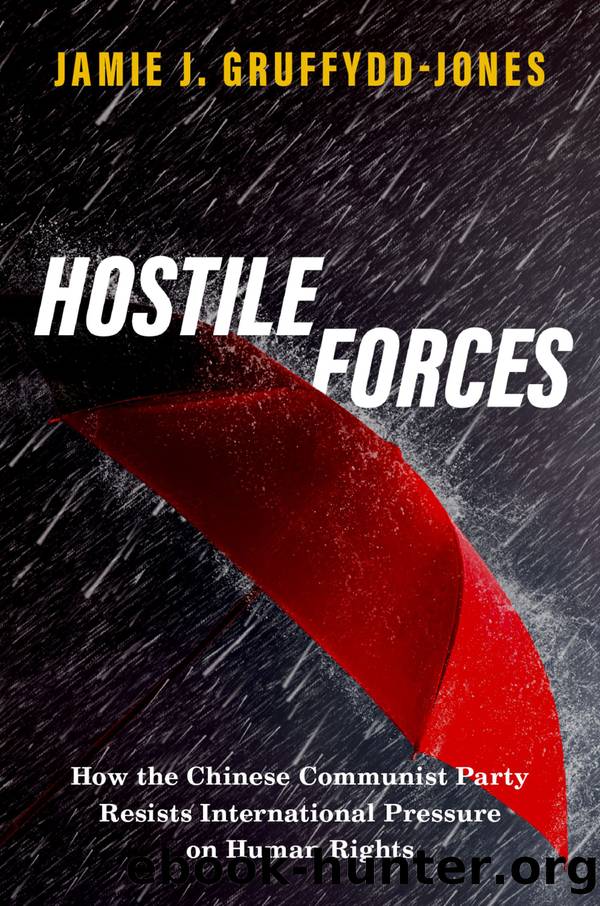Hostile Forces by Jamie J. Gruffydd-Jones;

Author:Jamie J. Gruffydd-Jones;
Language: eng
Format: epub, pdf
Publisher: Oxford University Press USA
Published: 2022-06-15T00:00:00+00:00
Perceived Hostility
So what explains this wide variety in reactions? Anger certainly played a role. On womenâs rights, some of our interviewees were evidently irritated when they read that the United States had criticized China. Take Wang, a forty-year-old businessman: âWomen are treated better in China than anywhere aroundâthese words are completely false. The United States just wants to target China for anything it can, to try and bring China down. Chinese women have nothing to do with themâthey should look after their own women. It makes me angry.â Even those who agreed that womenâs rights needed to be improved said that they found the criticism one-sided and politically driven. As Xiao Dong, a postgraduate researcher in his mid-twenties, said: âThese politicians donât care about women in China; theyâre always using human rights as an excuse to attack China, to try and poison international public opinion. Itâs just politicians being politicians; they always behave like this. Iâm bored of it to be honest.â
Overseas interviewees agreed. Huang said that the United States was using human rights to target China: âI always hear that America is criticizing China but treating other countries with tolerance. At the moment with Trump, he is always condemning China; it seems unfair. Because of Sino-US relations, the US needs to compete with China, and so to increase its competitiveness it feels it has to criticize China.â Mike agreed, in part: âI think the US does care to some extent, but I do think there is a deeper interest-driven motivation. There might be some issues in Tibet, but I think the US is criticizing China because it wants to exert some influence.â
Some overseas students explicitly linked supposed American hostility to their own beliefs about human rights in China. According to Wei Tai, fifty-three: âThis criticism of China is driven by prejudice. I believe that China does have areas it needs to improve, but we are definitely not as bad as America says.â Feng Shuo, thirty-three, said that as far as he was concerned, âI donât think the US actually cares about human rights, but rather is using this issue as political fuel on the international stage to attack China.â He went on to insist that âChina doesnât have issues with free speech, because we can speak freely. So other countries cannot criticize China on such matters.â
These comments were not just limited to human rights. Upon hearing that the United States had called on China to ban the ivory trade, Liu Jin, a factory worker, said that it was doing so âto attack the Communist Party,â while Li, a software engineer, said that the United States âdid not care about animals. As Chinaâs economy is developing and China is getting stronger, theyâre using it to cause trouble, so that every country focuses on China.â Student Zhao was more equivocal: âCriticism is fine; every country needs it. I donât like the attitude in these comments though; they seem to hold some prejudice against China.â
Interviewees were not just concerned with American hostility, but also its hypocrisy.
Download
This site does not store any files on its server. We only index and link to content provided by other sites. Please contact the content providers to delete copyright contents if any and email us, we'll remove relevant links or contents immediately.
Chaco's Northern Prodigies : Salmon, Aztec, and the Ascendancy of the Middle San Juan Region after AD 1100 by Paul F. Reed(338)
Law Enforcement Interpersonal Communication and Conflict Management by Brian Douglas Fitch(336)
Digital International Relations by Unknown(329)
Skilled interpersonal communication: Research, theory and practice, Fifth edition by Owen Hargie(316)
Critical Perspectives on Human Security : Rethinking Emancipation and Power in International Relations by David Chandler; Nik Hynek(316)
The Enduring Color Line in U.S. Athletics by Krystal Beamon Chris M. Messer(311)
Evidence-Based Policy Making in Labor Economics by Hamermesh Daniel S.;Nottmeyer Olga K.;Nottmeyer Olga;King Sarah;King Sarah;King Sarah;(280)
EPSO CAST Political affairs EU policies: How to succeed in the selection procedure by Franco Reverte José María(274)
Writing Public Policy - A Practical Guide to Communicating in the Policy Making Process by Catherine F. Smith(256)
Criminological Theory in Context by John Martyn Chamberlain(252)
Threshold Concepts in Women's and Gender Studies by Christie Launius Holly Hassel(250)
Tibeton Yoga Its Secret Doc by Evans-Wentz(249)
Positive Psychology and Spirituality in Counselling and Psychotherapy (Conflict, Ethics, and Spirituality, 12) by unknow(249)
Social Problems, Social Issues, Social Science by James Wright(246)
Rothschild and Early Jewish Colonization in Palestine (Geographical Perspectives on the Human Past) by Ran Aaronsohn(245)
Play in child development and psychotherapy: toward empirically supported practice by Sandra W. Russ(239)
Cognitive Development in Infancy and Childhood (Elements in Child Development) by Mary Gauvain(235)
Latin American Politics and Society by Gerardo L. Munck & Juan Pablo Luna(210)
What Makes a Social Crisis?: The Societalization of Social Problems by Jeffrey C. Alexander(209)
